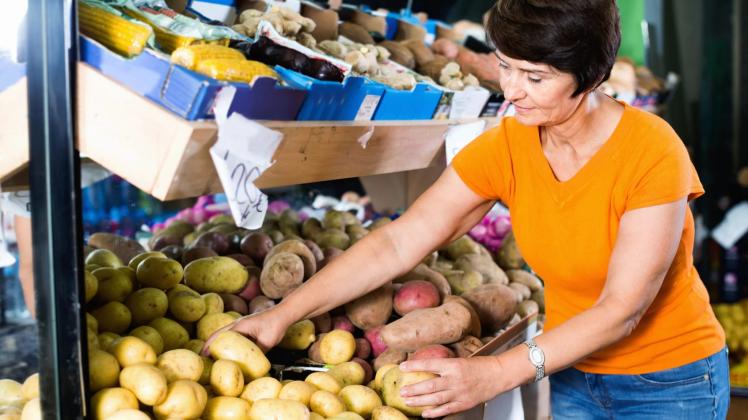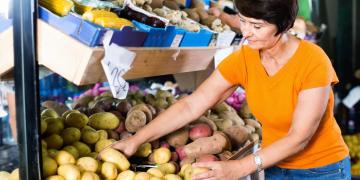Brazil: Potato consumption falls 90% in 50 years.
Potato consumption in Brazil does not reflect the versatility or nutritional value of this tuber. While neighboring and European countries maintain high averages, Brazilians consume only 4 kg of fresh (raw) potatoes per year.

To change this situation and reintroduce potatoes to family tables, the Brazilian Fresh Potato Association (ABBIN) is launching a challenge: to increase consumption by 50% in the next three years.
An overview of potato consumption in Brazil.
The number is alarming: 4 kg per year. This rate puts Brazil at a disadvantage compared to countries with similar food cultures. In Argentina, annual per capita consumption can reach 44 kg; in Peru, it exceeds 85 kg. Experts from ABBIN point out that this number reflects a historic drop of approximately 90% in fresh potato consumption over the last 50 years, a drastic change in the country’s eating habits.
The decline in fresh potato consumption in Brazil is not a mystery, but rather a reflection of rapid urbanization and the search for convenience. In recent decades, the processed potato segment, such as frozen french fries, has grown exponentially. The custom of cooking fresh potatoes, which requires a little more preparation, has been replaced by convenience.
See morePotato Market ReportPotato sorting equipment Argentina news Harvesting tools Planting machines Packaging materials Potato Central Market Solanum tuberosum Refrigerated storage equipmentAlthough potato consumption in Brazil has historically been low compared to other countries, the national production of this tuber is considerable, guaranteeing supply throughout the year. Approximately 100,000 hectares of potatoes are cultivated annually in a continuous cycle divided into three harvests (autumn, spring, and summer), with the states of Minas Gerais, São Paulo, and Paraná standing out.
The size of the production chain reflects ABBIN’s needs: although part of the production is absorbed by the processed food industry (potato chips and pre-fried products), the majority, around 65%, is destined for the fresh produce market, highlighting the solid base that the Association intends to expand, seeking to increase domestic consumption.
See moreRefrigerated storage equipmentpotatoesPotato Market ReportOnline advertisingPapaya cultivation coursesPrice variationProduction dataCentral Market of Buenos AiresMarket QuotesNewsletter subscriptionPotatoes: more nutritious than their fame, more Brazilian than their history.
One of ABBIN’s main missions is to combat the myth that potatoes are a "bad" food or that they cause weight gain.
Nutritional reality challenges common sense:
- Rich in potassium: The common potato has more potassium than a banana, an essential mineral for controlling blood pressure.
- Low in calories: When boiled or baked (without excessive added fat), potatoes contain fewer calories per gram than white rice or sweet potatoes.
- Source of vitamins: It is rich in vitamins C and B complex, as well as minerals and fiber.
The president of ABBIN, Marcos Boschni, also defends the cultural renaissance of the food: "The potato is not English, it’s Brazilian." By demystifying the terminology, the Association seeks to reinforce the value of the national product and encourage producers.
Potato production in Brazil
Although potato consumption in Brazil has historically been low compared to other countries, the national production of this tuber is considerable, guaranteeing supply throughout the year. Approximately 100,000 hectares of potatoes are cultivated annually in a continuous cycle divided into three harvests (autumn, spring, and summer), with the states of Minas Gerais, São Paulo, and Paraná standing out.
The country once ranked 21st among the world’s largest producers, with a total production of millions of tons. The size of the production chain reflects ABBIN’s needs: although part of the production is destined for the processed food industry (potato chips and pre-fried products), the majority, around 65%, is directed to the fresh produce market, highlighting the solid base that the Association intends to expand to boost domestic consumption.
See more Weather stations Books on agriculture Table Agricultural consulting services Market Papa Solanum tuberosum Papa quote Planting machinery Pest and disease control Potato Market ReportABBIN’s plan: how to increase potato consumption in Brazil by 50%.
ABBIN, founded in 2024, has set itself a clear and ambitious goal: to increase potato consumption in Brazil by at least 2 kg per Brazilian in the next 3 years.
See moreMarket PricespotatoestablePackaging materialsPotato sorting equipmentPotato VarietiesRefrigerated storage equipmentPotato WateringInsurance for potato cropsAgricultural consulting servicesTo achieve this 50% increase, the strategy is based on three pillars:
Nutritional education: Inform consumers about the real benefits of fresh potatoes, encouraging their consumption in healthy diets. Culinary versatility: Present the potato as an extremely versatile food that goes far beyond mashed potatoes and fried foods, being able to be the main ingredient in both sophisticated dishes and quick meals. Promotion of national production: Strengthen the quality and safety of potatoes grown by Brazilian farmers.The challenge is set: it’s time for Brazil to rediscover the flavor, health benefits, and history of one of the world’s most important foods. By incorporating fresh potatoes into their daily lives, consumers not only improve their diet but also support a production chain vital to the national economy.
Learn more about this and other topics: get to know ABBIN
To learn more about the challenges of potato consumption in Brazil and the Association’s initiatives, ABBIN invites you to listen to the podcast "A Voz da Batata" (The Voice of the Potato), which addresses this and many other crucial topics for the sector.
Stay up-to-date on the latest news about potato farming in Brazil and around the world, and receive nutritional tips and information. Visit the official ABBIN website and its social media channels to stay informed and be part of this mission to bring fresh potatoes back to Brazilian tables.
Fuente: abbin.org




